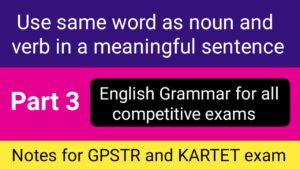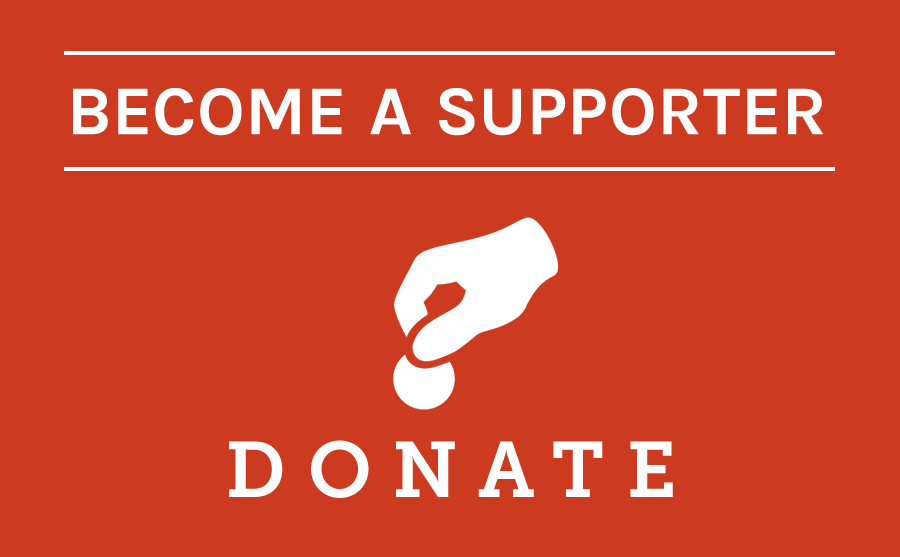
Same word used as noun and verb in a sentence in English grammar. Competitive English grammar for all competitive exams.
To get more video notes of English grammar visit our YouTube channel. This channel is very useful for all competitive exams.
1. Watch
Noun: My friend presented a watch as birthday presentation.
Verb: Please watch today’s news in the television.
2. Promise
Noun: He could not keep the promise he had given last month.
Verb: I promise my teacher that I will be a good student.
3. Damage
The damage on the company was very big.
You will damage the name and fame of the family.
4. Light
The light is so bright that it hurt my eyes.
I light the lamp to search my pocket.
5. Laugh
His laugh makes everyone feel happy.
You laugh in all the critical situation of life.
6. Transport
Bus transport in our village is not so good.
We use an autorikshwa to transport our all materials.
7. Object
The object he held belongs to my school.
I object to use bad words toward me.
8. Whistle
Physical teacher uses whistle to warn us.
Bus conductor whistles to stop the bus.
Use same word as noun and verb in a meaningful sentence
9. Play
We are going to see a play in the theatre.
I like to play in the garden.
10. Love
Love is a passion of new generation.
I love to go walking in the evening.
11. Park
They are playing in the park.
He will park my scotty in the playground.
12. Run
I go for a run in the morning.
They will run to get the train.
13. Chat
We like to have a chat with our close friends.
We chat in the WhatsApp to share our thoughts.
14. building
I am working in the nearest building.
They are building a big house in our city.
15. Switch
Turn off the light switch.
She will switch to another brand.
16. Lift
It is healthier to use stairs instead of a lift.
They will lift 50 k.g bag easily.
17. Judge
The judge decided that the woman was guilty.
I can judge which is right and which is wrong.
18. Axe
Give me the axe which was on the table.
You will axe the tree to use for furniture.
19. Record
He made a record in the national level games.
She will record our phone calls for the proof.
20. Answer
Give me the answer why are you too late.
She will answer all the questions in the interview.
Watch this video for explanation of using same word as noun and verb.
English has numerous word pairs that are spelled alike, but pronounced differently according to whether the word is being used as a noun or as a verb.
SAME WORD AS NOUN & VERB
English
has numerous word pairs that are spelled alike, but pronounced differently
according to whether the word is being used as a noun or as a verb.
Some
examples are conduct, digest, escort,
insult, produce, and record.
With each
of these words, and others like them, the accent shifts according to the part
of speech.
There are
many, many more examples of words that can be both nouns and verbs. Here are a
few that you’re probably familiar with:
WORK:
Noun- I
have a lot of «work» to do today.
Verb- A person
must «work» hard to achieve his or her goal.
HELP:
Noun- It
looks like she needs some «help.» verb- Will you please
«help» me?
RAIN:
Noun- We
definitely need the «rain.» verb-
When it
«rains,» it pours.
POLISH:
Noun-
There is too much «polish» on that brass. Verb-
They
needs to «polish» their essays.
SLEEP:
Noun- I
need some «sleep.» verb-
I could
«sleep» all ay
HEAT:
Noun- Turn that «heat» off.
Verb- The
weather will really «heat» up later in the day.
FIGHT:
Noun- Did
you watch the «fight?»
Verb-
Don’t «fights» her — she’s not worth it.
DRINK:
Noun- I’m
so thirsty, I could use a «drink» of water. verb- She needs to
«drink» her juice.
LAUGH:
Noun- You
gave me a good «laugh.»
Verb-
It’s not right to «laugh» at people with disabilities.
PAINT:
Noun-I
like that «paint!» verb- Do you want to «paint?»
HOPE:
Noun- Her
pep talk gave me «hope.» verb- I «hope» we win!
COUGH:
Noun- She
has a bad «cough.»
Verb-
Please doesn’t «cough» in the food.
FALL:
Noun- I
love everything about «fall!»
Verb- I
watched the apple «fall» off the tree.
TASTE:
Noun- I
like the «taste» of chocolate.
Verb-
«Taste» that ice cream.
KICK:
Noun- I
got a «kick» out of that!
Verb-
Let’s «kick» a ball. COVER:
Noun- The
undercover cop is using a reporter job as a «cover.» verb-
«Cover» the food when you’re barbecuing outside.
WATER:
Noun-
This «water» tastes so refreshing!
Verb-Do
not «water» your lawn!
Study Material, Lecturing Notes, Assignment, Reference, Wiki description explanation, brief detail
English : Same word as noun and verb |
The same word can be used as different parts of speech. In some cases, the pronunciation of the word remains the same even if it is used as a different part of speech. Examples are: exhibit, address, mistake, review, practice (noun) and practise (verb)
In some cases, the stress shifts from one syllable to another when the word is used as a different part of speech.
Examples are given below
CONduct (n) / conDUCT (v)
PROduce (n) / proDUCE (v)
REfuse (n) / reFUSE (v)
In some cases, there is a difference in spelling.
While words ending in –ce are nouns, the verbs have –se endings.
Device (n) / devise (v)
Advice (n) / advise (v)
Practice (n) / practise (v)
Exercise
State whether the underlined words are used as nouns or verbs in the following sentences.
1. Her conduct on the show was reasonably good.
2. They are going to conduct a workshop on biogas production.
3. Some nations produce much more than they need.
4. Thanks to good rainfall, this year the produce was pretty good.
5. Farmers should stop burning garden refuse as it causes pollution.
6. They refuse to change their ways.
7. This device can be operated manually.
8. We must devise a solution to cope with frequent power outages.
9. I advise you to mend your ways.
10. I don’t want to listen to your advice.
11. The new building houses the library.
12. The houses on this street have an old-world charm to them.
Answers
1. Her conduct on the show was reasonably good. (conduct – noun)
2. They are going to conduct a workshop on biogas production. (conduct – verb)
3. Some nations produce much more than they need. (produce – verb)
4. Thanks to good rainfall, this year the produce was pretty good. (produce – noun)
5. Farmers should stop burning garden refuse as it causes pollution. (refuse – noun)
6. They refuse to change their ways. (refuse – verb)
7. This device can be operated manually. (device – noun)
8. We must devise a solution to cope with frequent power outages. (devise – verb)
9. I advise you to mend your ways. (advise – verb)
10. I don’t want to listen to your advice. (advice – noun)
11. The new building houses the library. (houses – third person singular present simple tense from of the verb house)
12. The houses on this street have an old-world charm to them. (houses – noun)
The Same Word as Different Parts of Speech :
The meaning of a word in the sentence determines to what part of speech it belongs.
The same word may be sometimes one part of speech, sometimes another.
Words of entirely separate origin, meaning and use sometimes look and sound alike such as in…
The minstrel sang a plaintive lay.
He lay on the ground.
But the following examples show that the same word may have more than one kind of grammatical office (or function). It is the meaning which we give to a word in the sentence that determines its classification as a part of speech.
The chief classes of words thus variously used are
(1) nouns and adjectives
(2) nouns and verbs
(3) adjectives and adverbs
(4) adjectives and pronouns
(5) adverbs and prepositions
1. Nouns and Adjectives
The same word can be used as noun as well as adjective.
Noun : Rubber comes from South America.
Adjective : This wheel has a rubber tire.
Noun : That brick is yellow.
Adjective : Here is a brick house.
Noun : The rich have a grave responsibility.
Adjective : A rich merchant lives here.
The first two examples show how words that are commonly nouns may be used as adjectives.
The third shows how words that are commonly adjectives.
2. Nouns and Verbs
The same word can be used as noun as well as verb.
Noun : Hear the wash of the tide.
Verb :Wash those windows.
Noun : Give me a stamp.
Verb :Stamp this envelope.
Noun : It is the call of the sea.
Verb :Ye call me chief.
Other examples are : act, address, ally, answer, boast, care, cause, close, defeat, doubt, drop, heap, hope, mark, offer, pile, place, rest, rule, sail, shape, sleep, spur, test, watch, wound.
3. Adjectives and Adverbs
The same word can be used as adjective as well as adverb.
Adjective : That is a fast boat.
Adverb : The snow is melting fast.
Adjective : Draw a straight line.
Adverb : The arrow flew straight.
Adjective : Early comers get good seats.
Adverb : Tom awoke early.
Some adverbs have the same form as the corresponding adjectives.
You have guessed right.
How fast the tide ebbs!
The horse was sold cheap.
Tired men sleep sound.
Other examples are wrong, straight, early, late, quick, hard, far, near, slow, high, low, loud, ill, well, deep, close, just, very, much, little.
4. Adjectives and Pronouns
The same word can be used as adjective as well as pronoun.
Adjective : This man looks unhappy.
Pronoun : This is the sergeant.
Adjective : That book is a dictionary.
Pronoun : That is a kangaroo.
Adjective : Each day brings its opportunity.
Pronoun : I received a dollar from each.
5. Adverbs and Prepositions
The same word can be used as adverb as well as preposition.
Adverb : Jill came tumbling after.
Preposition : He returned after the accident.
Adverb : We went below.
Preposition : Below us lay the valley.
Adverb : The weeds sprang up.
Preposition : We walked up the hill.
Other examples are aboard, before, beyond, down, inside, underneath.
Miscellaneous examples of variation are the following.
Noun : The calm lasted for three days.
Adjective : Calm words show quiet minds.
Verb : Calm your angry friend.
Other examples are iron, stone, paper, sugar, salt, bark, quiet, black, light, head, wet, round, square, winter, spring.
Noun….Wrong seldom prospers.
Adjective….You have taken the wrong road.
Adverb….Edward often spells words wrong.
Verb….You wrong me by your suspicions.
Noun….The outside of the castle is gloomy.
Adjective….We have an outside stateroom.
Adverb….The messenger is waiting outside.
Preposition….I shall ride outside the coach.
Adjective…..That boat is a sloop.
Pronoun…..That is my uncle.
Conjunction….You said that you would help me.
Adjective…..Neither road leads to Utica.
Pronoun…..Neither of us arrived in time.
Conjunction…..Neither Tom nor I was late.
Preposition…..I am waiting for the train.
Conjunction…..You have plenty of time, for the train is late.
Interjection…..Hurrah! The battle is won.
Noun….I heard a loud hurrah.
Verb….The enemy flees. Our men hurrah.
The Same Word as Different Parts of Speech :
Grammar Index
The Same Word as Different Parts of Speech To HOME PAGE
The Same Word as Different Parts of Speech — The Same Word as Different Parts of Speech
LANGUAGE ARTS — Languages
Have You Ever Wondered…
- Can a word be both a noun and a verb?
- What’s the difference between nouns and verbs?
- Can you create your own funny sentences using the same word as a noun and a verb?
Today’s Wonder of the Day was inspired by Celina. Celina Wonders, “Why a word can be verb and noun?” Thanks for WONDERing with us, Celina!
Ready for some grammar? What was that? Did we hear a groan from someone out there?
Okay, we know grammar isn’t always the most exciting and fun subject during the school day — recess and lunch take those spots! — but it CAN be fun to play with words from time to time.
When you begin to learn grammar, you probably start with two of the most common parts of speech: nouns and verbs. Getting the hang of the difference between these two parts of speech puts you on the right track to becoming a good writer.
Nouns name things. Many times, you will hear people define nouns as persons, places, or things. But they can also name feelings, ideas, and acts.
Need an example? We just gave you one! Example is a noun. Some of our other favorite nouns are badger, Abraham Lincoln, vampire, Antarctica, couscous, love, indigestion, liberty and painting.
A noun that names one thing is singular. A name that names more than one thing is plural. For more information on singular and plural nouns, all you need to do is ask a moose.
Verbs describe action. We use verbs in sentences to describe what the nouns do. Monkeys peel bananas. Monkeys eat bananas. Monkeys love bananas. Peel, eat and love are all verbs in these sentences.
Hold on! Just a second. Not so fast. Just a couple of paragraphs ago, we said that love was a noun. Then we said love was a verb. Which is it?
Believe it or not, it’s both! Yes, it’s true. A word can be both a noun and a verb. In fact, there are many words that can be used to name a person, place, or thing and also describe an action.
For example, if you’re going fishing, you’ll need bait. Once you find an earthworm, you can use it to bait your hook. If it’s hot while you’re fishing, you might get thirsty for a drink. If you brought drinks in a cooler with you, you can drink the drink that you brought!
There are many, many more examples of words that can be both nouns and verbs. Here are a few that you’re probably familiar with:
- bowl
- exit
- fly
- park
- ship
Standards:
CCRA.R.1, CCRA.R.2, CCRA.R.4, CCRA.R.10, CCRA.W.3, CCRA.W.4, CCRA.L.1, CCRA.L.2, CCRA.L.3, CCRA.L.4, CCRA.L.5
Wonder What’s Next?
This Wonder of the Day is sure to SPORK your curiosity!
Try It Out
The examples above are just a few of the hundreds of words that can be both nouns and verbs. What others can you think of?
Put on your imagination hats and think of as many words as you can that can be both nouns and verbs. Then write some funny sentences using some of these words in both ways. See if you can make it into a story!
Find a newspaper or magazine article. Underline the nouns and circle the verbs. Review the words you marked and see if any were used as both a noun and a verb.
Explain to an adult or a friend about words that can be used as both nouns and verbs. See if they can come up with sentences of their own.
If you don’t mind, share some of your creative sentences with your Wonder Friends by posting them to Facebook. We can’t wait to read what you come up with!
Did you get it?
Test your knowledge
Wonder Contributors
We’d like to thank:
paris
for contributing questions about today’s Wonder topic!
Keep WONDERing with us!
What are you wondering?
Related Wonders for You to Explore


